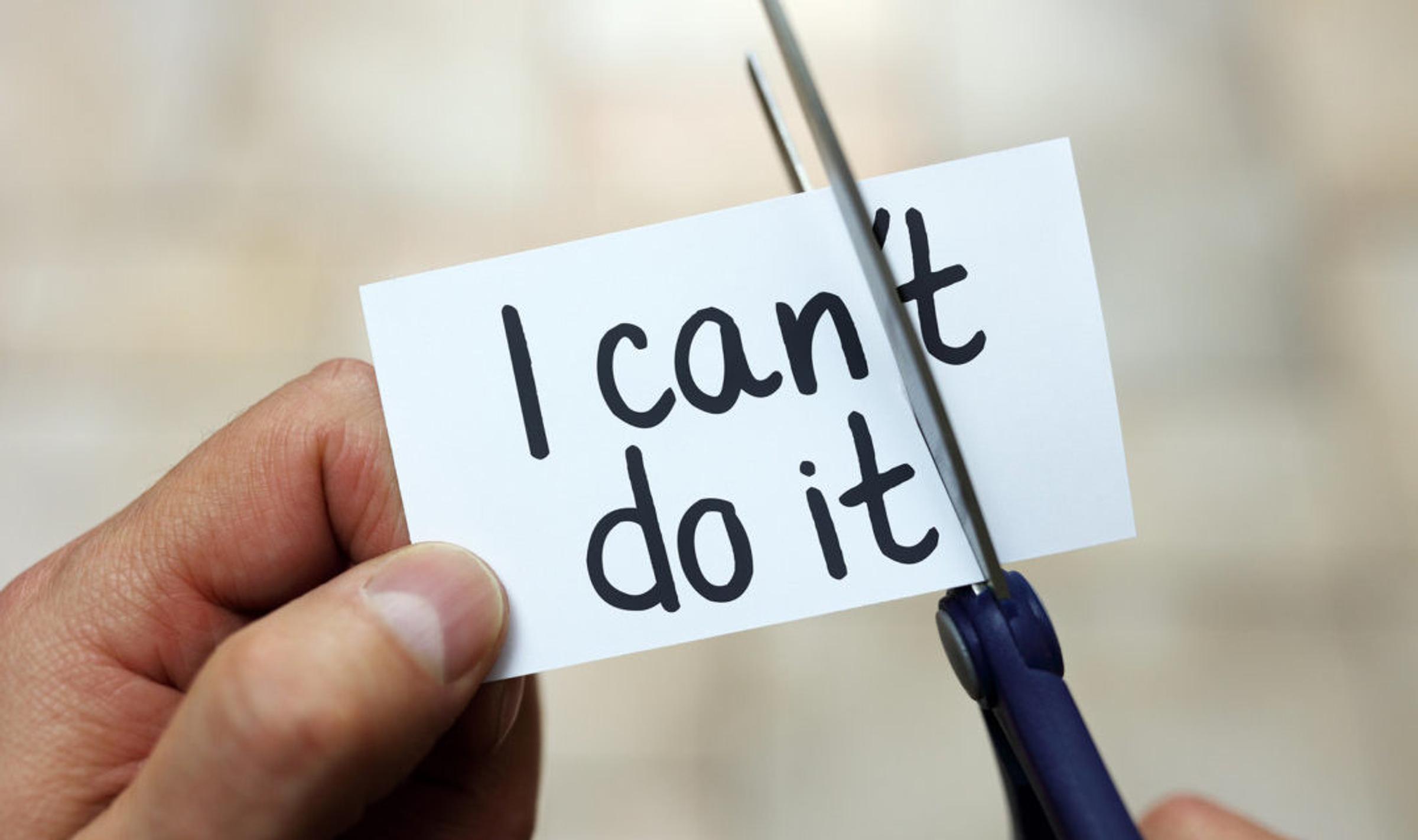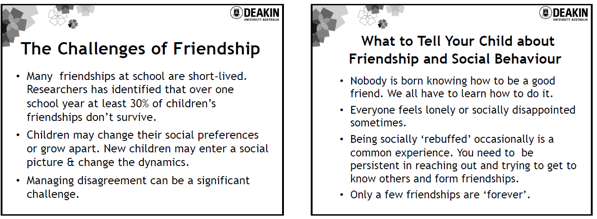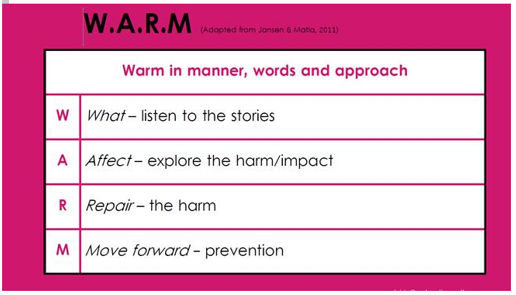assistant principal's message

assistant principal's message
Dear Families,
Last Wednesday, 5th of June, Dr Helen McGrath, counselling psychologist and Adjunct Professor at Deakin University and RMIT university outlined 16 key strategies that you can adopt to support your child to develop the skills of resilience and hence be more likely to become successful young adults.
This was a highly engaging and though-provoking evening with many ideas being discussed. Helen kindly gave us her slides. In the proceeding newsletters, I’ll consider especially relevant strategies, providing examples from students.
The first strategy under the microscope is # 11:
Help your child to become socially confident:
• Teach & model social skills
• Show them how to manage ‘normal’ social issues well
When considering the first statistic that:
Many friendships at school are short-lived. Research has identified that over one school year at least 30% of children’s friendships don’t survive… what does this mean?
When meeting with some of our grade 4 girls, it became apparent that while some friendships have challenges, our children are capable of navigating these ups and downs, and in turn often creating stronger friendship.
Below is Maddie and Indianna’s (Unit FK) understanding of the FRIENDSHIP PATH
If you’re wondering what a friendship path is, it is the journey you have with friends. The longer you have known the friend, the longer the path. When you have an argument the friendship path gets chipped or damaged. But when you and the friend solve the problem the friendship path heals and gets longer.
Given that 30% of friendships, don’t survive a year, we need to teach our children how to resolve friendships, so that your child has the greatest chance of creating long, lasting friendships.
By now I am confident that you are aware that as a school, we are working diligently and collectively to support your child taking risks with their learning, helping them build resilience and ultimately success in life. This has been discussed via newsletters and family information nights, including the Numeracy Family Night presented by Jessie Meade and Alice Hamilton on Thursday night. The learning pit and risk-taking were discussed in relation to becoming numerate people.
Many children feel worried about repairing relationships. It can be very uncomfortable when acknowledging what someone has done that has upset you, or what you have done that has upset someone else. As a result, many children and adults for that matter may deny any wrong-doing, or won’t talk directly to someone who has upset them. We know, that it is however essential for this to happen. We have to support children with this level of discomfort, accept responsibility, or let a ‘friend’ know if they’ve upset you. As one child said to me yesterday, “I want them to tell me if I’ve done something wrong, so I can fix it.”
At BNWPS, we use Restorative Practices to help your children build the requisite skills and strategies so that they can effectively repair relationships. At Tuesday’s staff meeting, Kristy Elliot, facilitated some further learning and revision on Restorative Practices. “Restorative Practice is what practitioners do when they use the principles, values and practices of the philosophy of Restorative Justice (RJ). Restorative Justice principles and processes have existed in some cultures for hundreds of years. The Restorative Justice Framework is a values-based, collaborative approach to dealing with harmful behaviour. People and relationships are viewed as the most important aspect of schools and communities. A basic need of all people is to feel connected to others (belonging) and respected within their communities (significance). These factors have a significant impact on relationships and in turn achievement.”
A beautifully simple and accessible approach which for me encapsulates the core strategies and values of Restorative Practices discussed was:
I trialled this strategy today with a group of students. It felt very natural.
When thinking of this approach with your children at home, consider the following:
W – Warm – Listen to their stories.
Who should start telling their stories first? – Possibly the victim, unless they are too distressed. How will you position yourself – can you sit in a circle? Do you need to arrange your children in a circle and lower yourself to their height?
Ensure that children understand that they’ll all get to speak, but only one person can speak at a time.
A – Affect – explore the harm / impact – this is a very important aspect – children need to be heard. Therefore if emotions are too high, you may need to find another time to chat so that everyone can talk in a calm and respectful way. Don’t rush over the emotions, children often really feel sad, worried, frustrated, angry – big emotions.
R – Repair the harm – children are crazy clever at this part – they will have solutions once you’ve gone through the above two points. Sometimes they may need some prompts, suggestions depending on the severity, frequency and impact of the harm. All children need to feel that they are part of fixing the problem.
M – Move forward – prevention – as Kristy said on Tuesday night, checking in with children about how they are going is VITAL. You may want to put it on your family calendar and follow this up. This is the chance to celebrate the effective actions and if actions haven’t been effective, then you may need to come up with other actions.
Kristy Elliot, will be facilitating a family night on Restorative Justice on Wednesday 28th of August. More information will be sent out next term. As always please discuss any of these ideas with me! I love a chat!!!
Take care
Wendy


